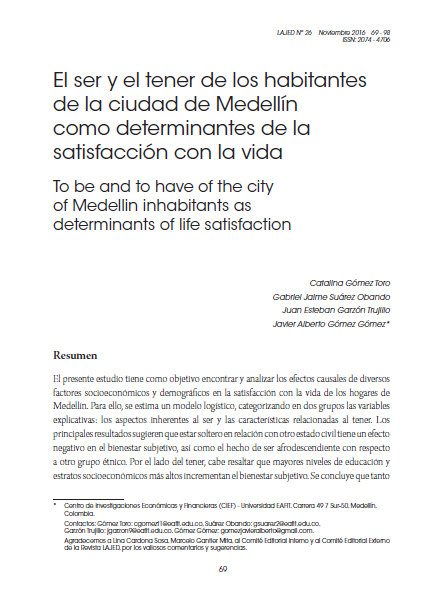To be and to have of the city of Medellin inhabitants as determinants of life satisfaction
DOI:
https://doi.org/10.35319/lajed.20162658Keywords:
Life satisfaction, Logistic Model, MedellínAbstract
This study aims to find and analyze the causal effects of various socioeconomic and demographic factors in life satisfaction of households in the city of Medellín. For this, a logistic model is estimated, categorizing into two groups the explanatory variables: the inherent aspects of being and the characteristics related with having material goods. The main results suggest that being single in relation to another marital state has a negative effect on subjective well being as well as being from African descent over another ethnic group. On the side of having, it should be noted that higher levels of education and higher socioeconomic strata increases subjective well being. It is concluded that both, the characteristics of “being” like those of “have” are fundamental to explain life satisfaction, and therefore for making public policy decisions.
Downloads
References
Alesina, A., R. Di Tella, y R. MacCulloch. 2004. “Inequality and Happiness: are Europeans and Americans different?”. Journal of Public Economics, 88(9):2009–2042.
Ansa Eceiza, M. M. 2005. “Economía y felicidad: Acerca de la relación entre bienestar material y bienestar subjetivo”. XI Jornadas de economía crítica. Bilbao, España.
Becchetti, L., L. Bruni y S. Zamagni. 2015. “Human values, civil economy, and subjective well-being”. World happiness report 2015, págs. 132-151. New York
Beytía, P. y E. Calvo. 2011. ¿Cómo medir la felicidad? (How to measure happiness?). Claves de políticas públicas, 4, Institute at Universidad Diego Portales, Santiago, Chile. Disponible en SSRN: https://ssrn.com/abstract=2302809
Blanchflower, D. G. y A. Oswald. 2000. The rising well-being of the young. Youth employment and joblessness in advanced countries. University of Chicago Press.
----------------. 2004. “Well-being over time in Britain and the USA”. Journal of public economics, 88(7):1359-1386.
Cameron, A. C. y P. K. Trivedi. 2005. Microeconometrics: methods and applications. Cambridge University Press.
Cruz, J. y J. Torres. 2006. “¿De qué depende la satisfacción subjetiva de los colombianos?”. Cuadernos de economía, 25(45):131-154.
Di Tella, R. y R. MacCulloch. 2008. “Gross national happiness as an answer to the Easterlin paradox?”. Journal of Development Economics, 86(1):22–42.
Di Tella, R., R. J. MacCulloch y A. J. Oswald. 2001. “Preferences over inflation and unemployment: Evidence from surveys of happiness”. The American economic review, 91(1):335-341.
------------------------. 2003. “The macroeconomics of happiness”. Review of Economics and Statistics, 85(4):809–827.
Diener, E., R. E. Lucas, S. Oishi y E. M. Suh. 2002. “Looking up and looking down: Weighting good and bad information in life satisfaction judgments”. Personality and Social Psychology Bulletin, 28(4):437–445.
Dolan, P., T. Peasgood y M. White. 2008. “Do we really know what makes us happy? A review of the economic literature on the factors associated with subjective well-being”. Journal of economic psychology, 29(1):94-122.
Easterlin, R. A. 1974. “Does economic growth improve the human lot? Some empirical evidence”. Nations and households in economic growth, 89:89-125.
Ferrer-i-Carbonell, A. y J. M. Gowdy. 2007. “Environmental degradation and happiness”. Ecological Economics, 60(3):509-516.
Frey, B. S. y A. Stutzer. 2000. “Happiness, economy and institutions”. The Economic Journal, 110(466):918-938.
--------------------. 2002a. “What can economists learn from happiness research?”. Journal of Economic literature, 40(2):402-435.
Frey, B. S., A. Stutzer et al. 2002b. “The economics of happiness”. World Economics, 3(1):1-17.
Galay, K. 2007. “Patterns of time use and happiness in Bhutan: Is there a link between the two”. Visiting Research Fellows Series, (432).
Graham, C., A. Eggers y S. Sukhtankar. 2004. “Does happiness pay? An exploration based on panel data from Russia”. Journal of Economic Behavior & Organization, 55(3):319-342.
Helliwell, J. F. 2003. “How’s life? Combining individual and national variables to explain subjective well-being”. Economic Modelling, 20(2):331-360.
Lelkes, O. 2006. “Knowing what is good for you: Empirical analysis of personal preferences and the ‘objective good’”. The Journal of Socio-Economics, 35(2):285-307.
Louis, V. V. y S. Zhao. 2002. “Effects of family structure, family SES, and adulthood experiences on life satisfaction”. Journal of Family Issues, 23(8):986-1005.
Luttmer, E. F. et al. 2005. Neighbors as negatives: Relative earnings and wellbeing. The Quarterly Journal of Economics, 120(3):963-1002.
Marks, G. N. y N. Fleming. 1999. “Influences and Consequences of Wellbeing among Australian Young People: 1980-1995”. Social Indicators Research, 46(3):301-323.
Medina, C. y J. A. Tamayo. 2012. “An assessment of how urban crime and victimization affects life satisfaction”. Social Indicators Research, (46) 91-147. En: Subjective Well-Being and Security, Springer.
Rojas, M. 2009. “Economía de la felicidad. Hallazgos relevantes respecto al ingreso y el bienestar”. El trimestre económico, 76(303):537-573. 94 El ser y el tener de los habitantes de Medellín como determinantes de la satisfacción con la vida
Schyns, P. 2001. “Income and satisfaction in Russia”. Journal of Happiness Studies, 2(2):173-204.
Singer, M. M. 2013. “Bribery diminishes life satisfaction in the Americas”. Americas Barometer Insights, 89:1-9.
Staubli, S., M. Killias y B. S. Frey. 2014. “Happiness and victimization: an empirical study or Switzerland”. European Journal of Criminology, 11(1):57-72.
Stutzer, A. 2004. “The role of income aspirations in individual happiness”. Journal of Economic Behavior & Organization, 54(1):89-109.
Theodossiou, I. 1998. “The effects of low-pay and unemployment on psychological well-being: a logistic regression approach”. Journal of health economics, 17(1):85-104.
Thoits, P. A. y L. N. Hewitt. 2001. “Volunteer work and well-being”. Journal of health and social behavior, 42(2), 115-131.
Veenhoven, R. 1994. “El estudio de la satisfacción con la vida”. Intervención psicosocial, 3:87-116.
Victoria García-Viniegras, C. R. e I. González Benítez. 2000. “La categoría bienestar psicológico: su relación con otras categorías sociales”. Revista cubana de medicina general integral, 16(6):586-592.
Zurick, D. 2006. “Gross national happiness and environmental status in Bhutan”. Geographical Review, 96(4):657-681.






